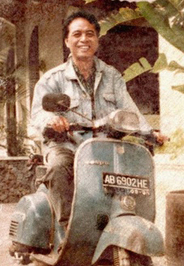
Sapardi Djoko Damono was an Indonesian poet known for lyrical poems, and who was widely regarded as the pioneer of lyrical poetry in Indonesia. He died in South Tangerang, Banten on 19 July 2020 after a long illness.
Subagio Sastrowardoyo was an Indonesian poet, short-story writer, essayist and literary critic. Born in Madiun, East Java, the Dutch East Indies, he studied at Gadjah Mada University, Cornell University and in 1963 graduated with an MA from Yale University. His debut as a writer came early with the publication of Simphoni (Symphony), a collection of poems, in 1957. The collection has been described as "cynical, untamed poetry, shocking sometimes". Simphoni was followed by several attempts at short story writing, including the publication Kedjananan di Sumbing, before Subagio settled on poetry as his main creative outlet. Following an extended stay in the United States he published a collection of poems entitled Saldju (Snow) in 1966. The poems in this collection deal with questions of life and death, and of the need for "something to hold on to in an existence threatened on all sides", and have been described as altogether more restrained than those in his earlier work. Additional works published since 1966 include Daerab Perbatasan (1970), Keroncong Motinggo (1975), Buku Harian (Diary), Hari dan Hara (1979)Simphoni Dua (1990), and several books of literary criticism. Subagio's collected poems have been published as Dan Kematian Makin Akrab (1995).
Ahmadun Yosi Herfanda, is an Indonesian journalist and poet. His name is also written as Ahmadun YH, Ahmadun Y. Herfanda, Ahmadun Herfanda, or AYH (ayeha). Ahmadun's poetry focuses on social and religious themes and is informed by Sufism. He is a reporter and arts editor at the daily newspaper Republika. Now he is known as a famous Indonesian poet and writer.
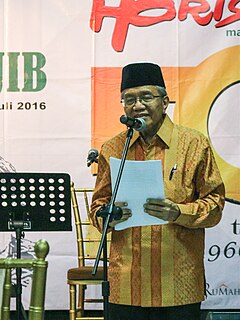
Taufiq Ismail is an Indonesian poet, activist and the editor of the monthly literary magazine Horison. Ismail figured prominently in Indonesian literature of the post-Sukarno period and is considered one of the pioneers of the "Generation of '66". He completed his education at the University of Indonesia. Before becoming active as a writer, he taught at the Institut Pertanian Bogor. In 1963, he signed the "Cultural Manifesto" as a document that opposed linking art to politics. This cost him his teaching position at the Institut.

Umar Kayam was an Indonesian sociologist and writer.
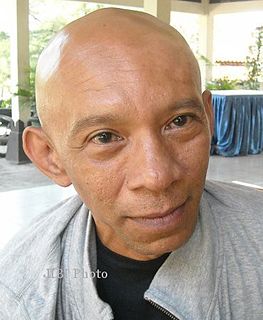
Afrizal Malna, is an Indonesian activist, writer of prose, poetry, and theatrical texts.

Ajip Rosidi was an Indonesian poet and short story writer. As of 1983 he had published 326 works in 22 different magazines.

Christophorus Apolinaris Eka Budianta Martoredjo, also known as C. A. Eka Budianta, more commonly known as Eka Budianta is an Indonesian poet. He was born into a Catholic family and was the second child of nine. His grandparents were farmers. His parents were public elementary school teachers. His father later worked at the local office for the Ministry Education and his mother became a school principal. After graduating from St. Albertus high school in Malang (Dempo), he attended the Lembaga Pendidikan Kesenian Jakarta, now known as Institut Kesenian Jakarta but did not complete his studies. From 1975 to 1979, Eka Budianta studied Japanese literature at the Department of East Asian Studies Literature then changed to the Department of History, Faculty of Letters, University of Indonesia. He then studied journalism at Los Angeles Trade-Technical College in the United States from 1980–81.

Toeti Heraty is an Indonesian poet.
Oka Rusmini is an Indonesian poet and novelist. She is a recipient of the S.E.A. Write Award.
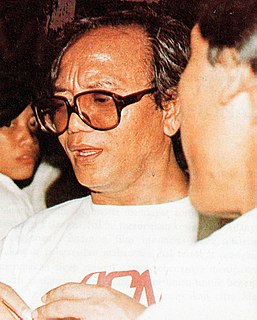
Arifin Chairin Noer was an Indonesian poet, theater director and film producer.

Sariamin Ismail was the first female Indonesian novelist to be published in the Dutch East Indies. A teacher by trade, by the 1930s she had begun writing in newspapers; she published her first novel, Kalau Tak Untung, in 1933. She published two novels and several poetry anthologies afterwards, while continuing to teach and – between 1947 and 1949 – serving as a member of the regional representative body in Riau. Her literary works often dealt with star-crossed lovers and the role of fate, while her editorials were staunchly anti-polygamy. She was one of only a handful of Indonesian women authors to be published at all during the colonial period, alongside Fatimah Hasan Delais, Saadah Alim, Soewarsih Djojopoespito and a few others.
Darmanto Jatman was an Indonesian poet and writer. He was an Emeritus Professor at the Faculty of Psychology, Diponegoro University (UNDIP), Semarang. He was known as a humanist, philosopher and poet of Indonesia. He gave birth to the establishment of the Faculty of Psychology at UNDIP and became the first professor in the faculty. On 27 July 2007, Susilo Wibowo of UNDIP gave him the title of Professor, exactly a month before he retired, so that he was immediately given the title of Emeritus Professor.
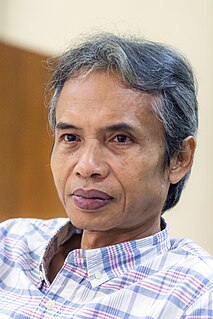
Joko Pinurbo is an Indonesian poet. His poetry is a mixture of narrative, irony, and self-reflection.

Iman Budhi Santosa, commonly known as IBS, was an Indonesian author based in Yogyakarta. Born in Magetan, East Java, IBS was educated in agriculture but drawn to literature from a young age. In 1969, he helped establish the Persada Studi Klub, later publishing numerous works, including poetry collections, novels, and short stories. His poetry has been considered to have strong Javanese cultural influences.

Korrie Layun Rampan was an Indonesian novelist, short story writer, poet, literary critic, journalist, and politician.
C. Soebakdi Soemanto was an Indonesian writer, poet, playwright, editor, and professor at the Faculty of Cultural Sciences, Gadjah Mada University (UGM), Yogyakarta.
Triyanto Triwikromo is an Indonesian writer born in Salatiga, Central Java, on 15 September 1964.

Deknong Kemalawati is one of the leading poetess of modern Indonesia, chairman of the Art Council Banda Aceh, winner of the Literary Prize of the Government of Aceh.

Dimas Arika Mihardja was an Indonesian poet and scholar, essayist. He wrote under a pseudonym, the real name is Sudaryono. Among friends he was called as Dam.
